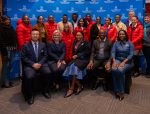In a decisive victory for international contract enforcement, London-listed mining investment firm Kazera Global has been awarded $11.9 million (about N$216 million) plus legal costs in a binding arbitration ruling against China’s Hebei Xinjian Construction, marking the culmination of a high-stakes dispute over the sale of African Tantalum (Aftan), a strategic Namibian asset. The ruling, delivered in Windhoek under Namibian arbitration law, not only vindicates Kazera’s claims of contractual breach but also underscores the growing scrutiny of payment compliance in cross-border mining deals across Africa.
The conflict traces back to December 2022, when Kazera entered into a sale agreement with Hebei to offload its entire 100% stake in Aftan, a subsidiary holding tantalum mining rights in Namibia, for $13 million. Tantalum, a rare metal critical for electronics and aerospace industries, has seen surging global demand, positioning Aftan as a prized asset. However, Hebei—a subsidiary of a major Chinese construction conglomerate—defaulted on its obligations after paying only $4.1 million upfront, leaving a $8.9 million balance unpaid despite repeated demands.
Frustrated by Hebei’s refusal to settle, Kazera invoked the dispute resolution clause of the sale agreement, initiating arbitration proceedings in September 2024. After eight months of deliberations, the tribunal ruled unequivocally in Kazera’s favor, ordering Hebei to pay $9.2 million in outstanding principal, $1.6 million in pre-October 2024 interest, and an additional 20% annual interest on the principal from October 9, 2024, until full settlement. As of May 6, 2025, the cumulative tally—including daily accruals—stood at $11.9 million, excluding Hebei’s obligation to cover Kazera’s legal and arbitration fees, which are expected to add significant heft to the final sum.
Kazera CEO Dennis Edmonds hailed the ruling as a “resounding affirmation of contractual integrity,” emphasizing its importance to shareholder confidence. “This outcome validates our unwavering stance that Hebei failed to honor its commitments. While arbitration was a necessary detour, it has not derailed our operational momentum. We now shift focus to enforcing this award and accelerating growth across our portfolio,” Edmonds stated. The CEO further noted that the drawn-out dispute had consumed managerial bandwidth but assured stakeholders that Kazera’s other projects, including diamond and heavy mineral sands ventures in Namibia, remained on track.
The ruling’s implications extend beyond financial recovery. Legal experts highlight its precedent-setting value in Namibia’s evolving arbitration landscape, where foreign investors increasingly rely on local dispute mechanisms to resolve conflicts.
However, the path to payment remains fraught. Hebei, which has operations across Africa, has yet to publicly respond to the ruling. Kazera now faces the complex task of enforcing the award across jurisdictions, particularly if Hebei opts to challenge or delay compliance. The company has enlisted specialist legal teams to pursue asset seizures or court orders in jurisdictions where Hebei operates, including potential targets in Namibia, South Africa, and China. Industry analysts caution that enforcement could take months, if not years, depending on Hebei’s cooperation and jurisdictional complexities.
The dispute also casts light on broader challenges in Africa’s mining sector, where delayed payments and contract renegotiations have occasionally marred deals with foreign partners. Aftan’s tantalum operations, located in Namibia’s mineral-rich Erongo Region, represent a strategic foothold in the global supply chain. With electric vehicle and tech manufacturers scrambling to secure critical minerals, Kazera’s ability to monetize the award could bolster its balance sheet and fund expansion.
For now, Kazera’s leadership is channeling optimism. The firm, which acquired Aftan in 2017 as part of a diversification strategy, views the arbitration win as a catalyst to refocus on its core assets. These include the Tantalite Valley Mine—a historically significant site—and the Diamond Mine X, which is slated to begin trial production in late 2025. “This ruling isn’t just about recovering dues; it’s about reaffirming our operational discipline and strategic vision,” Edmonds remarked.
As the dust settles, stakeholders are watching closely to see whether Hebei will comply or prolong the battle. For Namibia, the case underscores the robustness of its legal frameworks in safeguarding investor rights—a critical selling point as the nation courts mining investment to diversify its economy. For Kazera, the $11.9 million award represents not just a financial windfall, but a hard-won testament to resilience in the volatile world of mineral resource development.
With global tantalum prices projected to rise 8% annually through 2030, the resolution of this dispute may well position Kazera to capitalize on renewed interest in Namibia’s mining sector, turning a legal triumph into a springboard for long-term growth.










